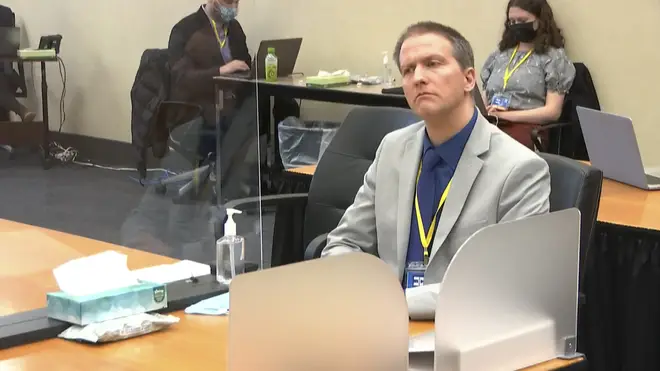
Nick Ferrari 7am - 10am
21 April 2021, 01:14

The jury deliberated over parts of two days in a city on edge against another outbreak of unrest.
Former Minneapolis police officer Derek Chauvin has been convicted of murder and manslaughter for pinning George Floyd to the pavement with his knee on the black man’s neck.
Chauvin, 45, could now be sent to prison for decades.
The jury comprising six white and six black or multi-racial people came back with its verdict after about 10 hours of deliberations over two days.
President Joe Biden said Chauvin’s conviction “can be a giant step forward” for the nation against systemic racism, while Vice President Kamala Harris said: “This is a day of justice.”
Chauvin was found guilty on all charges: second-degree unintentional murder, third-degree murder and second-degree manslaughter.
His face was obscured by a Covid-19 mask, and little reaction could be seen beyond his eyes darting around the courtroom.
His bail was immediately revoked and he was led away with his hands cuffed behind his back.
The verdict was read in a courthouse ringed with concrete barriers and razor wire and patrolled by National Guard troops, in a city on edge against another round of unrest — not just because of the Chauvin case but because of the deadly police shooting of a young black man, Daunte Wright, in a Minneapolis suburb on April 11.
The jurors’ identities were kept secret and will not be released until the judge decides it is safe to do so.

Three other former Minneapolis officers charged with aiding and abetting murder in Mr Floyd’s death will stand trial in August.
As celebrations broke out in Minneapolis and elsewhere in the US, President Biden and Ms Harris called Mr Floyd’s family and said of himself and his vice president: “We’re all so relieved”.
Floyd family lawyer Ben Crump posted video on Twitter of the phone call. Asked by a family member how he was doing, Mr Biden said: “Feeling better now. Nothing is going to make it all better, but at least now there is some justice.”
“This is a day of justice,” Harris told the family after joining Mr Biden to watch the verdict in the private dining room off the Oval Office.
Speaking a few hours before the verdicts were announced, Mr Biden said: “They’re a good family and they’re calling for peace and tranquillity no matter what that verdict is. I’m praying the verdict is the right verdict. I think it’s overwhelming, in my view. I wouldn’t say that unless the jury was sequestered now.”

Former president Barack Obama said the conviction was correct, but only one step in the fight for justice.
He said in a statement that true justice requires Americans to understand that “Black Americans are being treated differently every day” and that millions live in fear that their next encounter with law enforcement could be their last.
Oprah Winfrey, one of the most prominent black women in America, said she was “grateful to every juror for seeing and acknowledging what the world saw on that tape”.
She wrote on Instagram: “Relieved—and emotional in ways I didn’t expect. I cried tears of joy as each verdict was read. I’m grateful to the witnesses and their testimonies.”
Mr Floyd’s brother Philonise said: “I get DMs, people from Brazil, from Ghana, from Germany — everybody — London, Italy, they’re all saying the same thing: ‘We won’t be able to breathe until you’re able to breathe.’ Today, we are able to breathe again.”
British Prime Minister Boris Johnson tweeted: “I was appalled by the death of George Floyd and welcome this verdict. My thoughts tonight are with George Floyd’s family and friends.”
Mr Floyd, 46, died on May 25 after being arrested on suspicion of passing a counterfeit 20 dollar bill for a pack of cigarettes at a corner market. He panicked, pleaded that he was claustrophobic and struggled with police when they tried to put him in a squad car. They put him on the ground instead.
The centrepiece of the case was the bystander video of Mr Floyd gasping repeatedly, “I can’t breathe” and onlookers yelling at Chauvin to stop as the officer pressed his knee on or close to Mr Floyd’s neck for what authorities say was nine-and-a-half minutes.
Mr Floyd slowly went silent and limp.
George Floyd's family and community deserved for his killer to be held accountable.
Today, they got that accountability.
Always and forever, Black lives matter.
— Hillary Clinton (@HillaryClinton) April 20, 2021
Prosecutors played the footage at the earliest opportunity, during opening statements, with Jerry Blackwell telling the jury: “Believe your eyes.”
And it was shown over and over, analysed one frame at a time by witnesses on both sides.
In the wake of Mr Floyd’s death, demonstrations and scattered violence broke out in Minneapolis, around the country and beyond. The furore also led to the removal of Confederate statues and other offensive symbols such as Aunt Jemima.
In the months that followed, numerous states and cities restricted the use of force by police, revamped disciplinary systems or subjected police departments to closer oversight.

Chauvin attorney Eric Nelson called a police use-of-force expert and a forensic pathologist to help make the case that Chauvin acted reasonably against a struggling suspect and that Mr Floyd died because of an underlying heart condition and his illegal drug use.
Mr Floyd had high blood pressure, an enlarged heart and narrowed arteries, and fentanyl and methamphetamine were found in his system.
Under the law, police have certain leeway to use force and are judged according to whether their actions were “reasonable” under the circumstances.
The defence also tried to make the case that Chauvin and the other officers were hindered in their duties by what they perceived as a growing, hostile crowd.